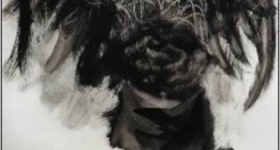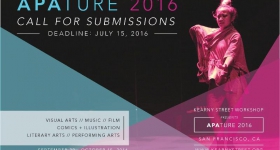“Joy lies in blood, bread, / art, medicine,” says Amit Majmudar in Dothead, his third collection of poetry. He is a nuclear radiologist, as well as Ohio’s first poet laureate, and his poems draw eclectically from subjects as wide-ranging as Adam and Eve’s sex life, the art of the semi-colon and T.S.A. security lines. It’s for good reason that the book’s epigraphic image features a page of entries from a 1886 glossary of “Anglo-Indian Words and Phrases,” one of which is “Kedgeree, Kitchery,” a lentil-and-rice dish described as a “mixtur[e] of sundry kinds.” Dothead’s table of contents, labeled “Kedgeree Ingredients,” announces that, like kedgeree, the collection is “a mixture of all together, or Refuse of Rough, Yellow, and Unequal.” With wit and linguistic flair, Majmudar’s work makes an argument for poetry as a language in its own right -- a vital, valuable contribution to a culture that may not always recognize poetry as widely as it ought to.
Dothead’s title poem begins, “Well yes, I said, my mother wears a dot. / I know they said “third eye” in class, but it’s not / an eye eye, not like that,” an immigrant child’s indignant retort to an unseen interlocutor. A racist. An ignoramus. Or maybe just “[W]hite kids” who were “friends, / at least as I defined a friend back then.” An atmosphere of ignorance. Either way, this ambient cultural blindness is a precondition of the poem’s existence; and yet, with a few swift moves, some of them formal (the lightness of tone, the a a b b rhyme scheme), and some of them content-based (at the poem’s end, the speaker smears ketchup on his forehead and “burned those schoolboys in their seats, / their flesh in little puddles underneath”), the poet shifts the frame from misunderstood minority figure to something entirely new. Performance. Play. Levity and grimness -- and in rhymed couplets, no less.
While it’s true that Majmudar’s experience as a South Asian in America informs his work, what most prominently marks Dothead is the tone he takes throughout the collection. His commitments are clear: humor, as evidenced by the Dr. Seuss quote that opens the book, “It is fun to have fun / But you have to know how,” and a poetic persona that flirts with the gravest of subjects -- terrorism, torture, Islamophobia, and the militarization of the U.S. state -- with light verse, rhymes, puns and other wordplay. A line from “The Illuminator”: “An alif must not be reborn as a leaf, nor a laam as a lamb, nor a baa as a sheep.” These are the acts of a nimble mind, a virtuoso of language who looks squarely at society and names, in language all his own, what he sees. In so doing, Majmudar assumes a stance appropriate for a poet laureate, making clear claims on what poetic language can -- and should -- do in relation to a nation’s predilections and politics, all the while making the claim that he will not be too serious.
Which, of course, makes the seriousness of the subject matter a kind of sneaking surprise. Thus, poems like “1914: The Name Game,” a history of international warfare:
It's time for the name game, children, the blame game.Come get your clues. Now what begins with B?Beginnings, Baghdad, Balfour, Bosch, Berlin, let's see...[...]The names, the names, the names remain,These letters, nailed in place,Though soldiers down in the soiled earthThough Tommies drowned in the solid earthVanished without aMarnefully sobbing, hiccuping Ypres Ypres,The mum of the lad (she, unidentified; he, unidentifiable)Expects no Clemenceau from stern War.
One hears in this poem Dr. Seuss, T.S. Eliot, and elsewhere, as in “The Interrogation,” echoes of the hallowed Western canon, in couplets that keep pace with the traditional pentameter line, resulting in the unusual phenomenon of a torture narrative written in rhymed verse:
I imagined my arm as a slope I had to scale,
shaft of the humerus as smooth as shale
but white like bone and giving way like sand
wherever I set foot. I could't stand...
It’s tradition tweaked: the pentameter line contracted and expanded, the a a b b rhyme scheme slightly displaced. Yet, the weight of the Western tradition is keenly felt, to somewhat disconcerting effect. The reader, swept along by the poem’s iambs and jaunty, masculine rhymes (see/sea, more/for, scale/shale), makes it midway through before waking from the reverie of English verse with the realization that “The Interrogation” is a critique of the very civilization that gave birth to this particular prosody. It’s rare to find lines of iambic pentameter in contemporary poetry; rarer still to find them deployed in the service of “political” poetry. The result is a complex tonal medley that both resists and demands serious attention.

Amit Majmudar
Indeed, Dothead’s relationship to aspects of Western civilization is a complicated one. In “The Enduring Appeal of the Western Canon,” the poet takes irreverent jabs at artistic luminaries like Michelangelo and Monet and later, in the prose sequence “Abecedarian,” gleefully details the history of fellatio, beginning with Adam and Eve (“the arousal of Adam to life was the first blow job”). At the same time, in more places than one, his poems find themselves haunted by the cadence of Christian theology and sacred texts. Both in syntax and subject matter, the long poem “Logomachia” returns, Christ-haunted, to the site where the “Father / tortured the Son in front of his Mother / until she wailed please stop for the love of Christ—” The sequence continues, “I just couldn’t breathe in its shadow. / It weighed what the cross weighed, that shadow / Cross, more than any shadow should.”
It’s in a long poem like “Logomachia” that we see Majmudar’s writing at its finest: his gaze sustained over several pages of a sequence, where it might otherwise dabble or flit, the work of a generalist leaping from one subject to the next (human appetite, James Bond, endangered species). Here, however, it lingers, and the linguistic play characteristic of the book creates a meaningful field that the reader can fully enter because he or she is allowed to tarry a while longer. Language, disease and the body, questions about the divine, culture and philosophy; these matters, evoked through the poet’s mastery of language and form (fugue, ghazal, erasure), serve to artfully ground the “fun” sought throughout the pages of this unique collection.
Majmudar has an uncanny ear and a true craftsman’s sense of his material; his sense of poetry as a made thing, as conjured textures of sound and linguistic pattern, is truly noteworthy. Yet, to write a book of poems like Dothead -- prefaced with a quote by Dr. Seuss, filled with rhymed couplets, wordplay, and the like --runs the risk of having too much fun. It’s when this sensibility is held long enough to reveal its complex layers of tone and conjecture that we most fully witness the author’s commitment to poetic language: play, prosody, and, equally as important, a sense of the poet in the world.










Comments